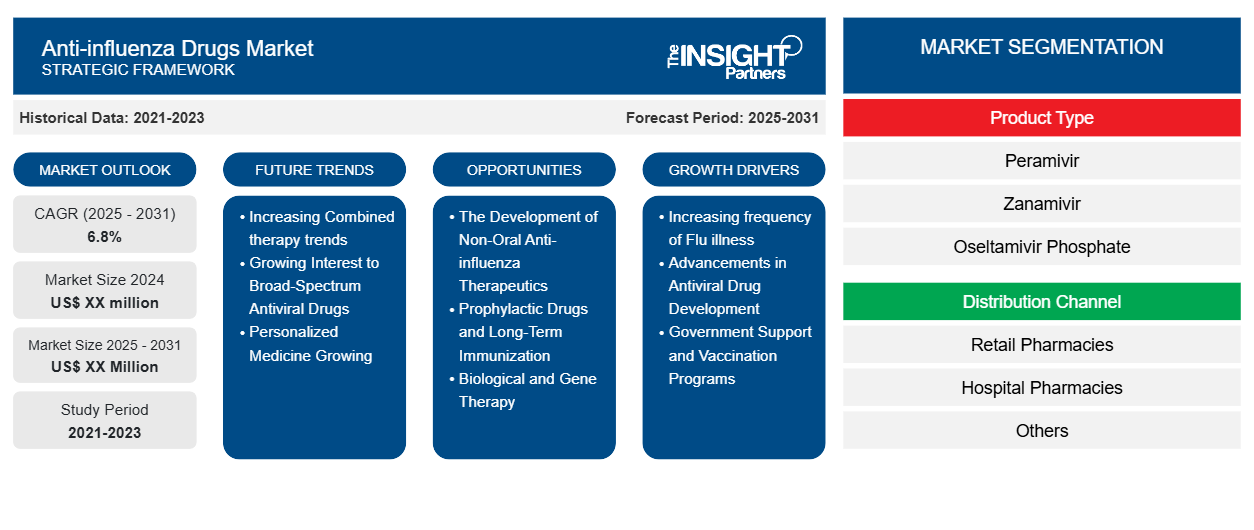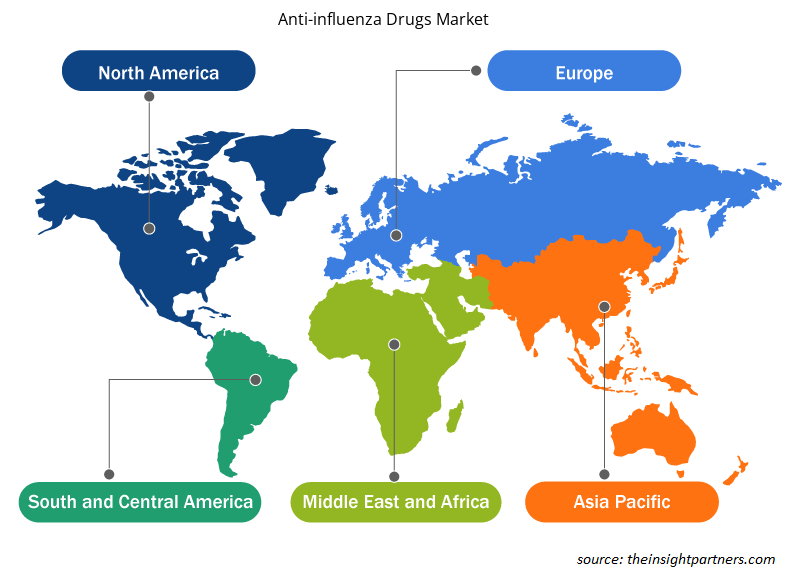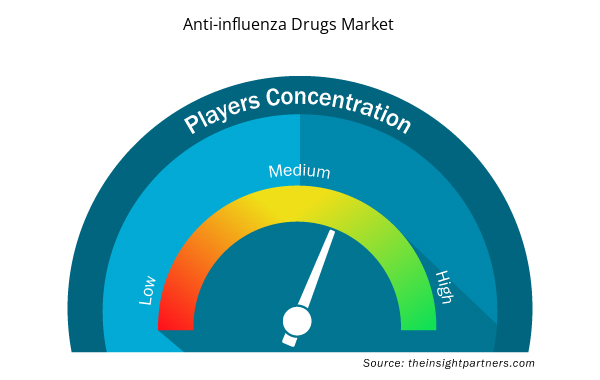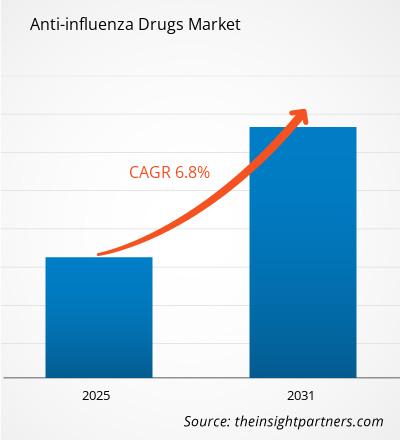The Anti-influenza Drugs Market is expected to register a CAGR of 6.8% from 2025 to 2031, with a market size expanding from US$ XX million in 2024 to US$ XX Million by 2031.
The report is segmented by Product Type (Peramivir, Zanamivir, Oseltamivir Phosphate, Baloxavir Marboxil, and Other Products). The report further presents analysis based on the Distribution Channel (Retail Pharmacies, Hospital Pharmacies, and Others). The global analysis is further broken-down at regional level and major countries. The Report Offers the Value in USD for the above analysis and segments.
Purpose of the Report
The report Anti-influenza Drugs Market by The Insight Partners aims to describe the present landscape and future growth, top driving factors, challenges, and opportunities. This will provide insights to various business stakeholders, such as:
- Technology Providers/Manufacturers: To understand the evolving market dynamics and know the potential growth opportunities, enabling them to make informed strategic decisions.
- Investors: To conduct a comprehensive trend analysis regarding the market growth rate, market financial projections, and opportunities that exist across the value chain.
- Regulatory bodies: To regulate policies and police activities in the market with the aim of minimizing abuse, preserving investor trust and confidence, and upholding the integrity and stability of the market.
Anti-influenza Drugs Market Segmentation
Product Type
- Peramivir
- Zanamivir
- Oseltamivir Phosphate
- Baloxavir Marboxil
- Other Products
Distribution Channel
- Retail Pharmacies
- Hospital Pharmacies
- Others
Customize This Report To Suit Your Requirement
You will get customization on any report - free of charge - including parts of this report, or country-level analysis, Excel Data pack, as well as avail great offers and discounts for start-ups & universities
Anti-influenza Drugs Market: Strategic Insights

- Get Top Key Market Trends of this report.This FREE sample will include data analysis, ranging from market trends to estimates and forecasts.
Anti-influenza Drugs Market Growth Drivers
- Increasing frequency of Flu illness: An increasing incidence of influenza infections globally is one of the significant forces driving the anti-influenza drugs market. Such viral infections occurred in seasonal outbreaks and sometimes pandemics, as evidenced by the H1N1 outbreak of 2009 and the emergence of possibly new strains, and this demand for effective antiviral drugs is continually rising. In temperate areas of the world, the flu season typically recurs each year with considerable market upside.
- Advancements in Antiviral Drug Development: Antiviral drug development is another major driver. Companies are actively moving ahead with and discovering new medicines to work against new strains of influenza, and these have led to the introduction of new antiviral medicines like neuraminidase inhibitors-discovered so far are oseltamivir and zanamivir, which have restructured strategies toward treatment. Also, a growing inclination toward broad-spectrum antiviral therapy, where targeting will include a broad spectrum of influenza viruses, ensures the incoming arrival of new medicines onto the marketplace.
- Government Support and Vaccination Programs: Governments are now devoting increasing numbers of resources to the immunization of their populations against influenza and the use of therapeutics for its prevention and treatment. Thus, national healthcare entities such as the CDC and the WHO recommend antiviral drugs for high-risk populations. This produces increased demand for anti-influenza drugs and guarantees the inclusion of such medications in essential healthcare programs. In some countries, policy creation toward public health policies such as subsidized antivirals, which will further decrease the burden of influenza on the population, has boosted market growth.
Anti-influenza Drugs Market Future Trends
- Increasing Combined therapy trends: Change from the single-drug use for antiviral therapy into duality, wherein different types of antiviral agents are being utilized put advancement in their efficacy and even reduce resistance. This trend develops into thorough advances against the constantly evolving and resistant strains of influenza viruses, which usually make single-target therapies less effective.
- Growing Interest to Broad-Spectrum Antiviral Drugs: As certain strains of viruses continue mutating, the focus has now been narrowed to broad-spectrum antiviral drugs with several viral strains. This evolution is attributed to the interest of such treatments from seasonal flu strains to pandemic strains. Research on drugs targeting a wider range of taxa, particularly those affecting other respiratory viruses such as coronaviruses, is also becoming a very active research thrust in antiviral drug development.
- Personalized Medicine Growing: This popular trend would impact the market for anti-influenza drugs as well. Personalized medicine affects the type of treatment design that goes into the particular genetic make-up, immune response, and other factors of an individual. Such importance is even more put into practice with influenza, which has so many different antiviral agents with varying effectiveness in individual patients. The development of biomarkers predicting drug responses would therefore be one key area to optimise treatment regimens for influenza.
Anti-influenza Drugs Market Opportunities
- The Development of Non-Oral Anti-influenza Therapeutics: The development of non-oral anti-influenza therapeutics has generated a lot of interest; inhalers, nasal sprays, and intravenous formulations are some examples. These delivery mechanisms can be very preferred methods of drug administration for those patients who cannot take capsules or are otherwise needy and requiring immediate remedy, such as those confined in a hospital. Thus, the demand for alternative drug delivery systems is expected to continue growing and opportunities for the development of the drug market.
- Prophylactic Drugs and Long-Term Immunization: Market growth is expected in prophylactic anti-influenza drugs specifically dedicated to high-risk groups because they would include both the treaters and preventers of influenza infections. The increasing need to protect against longer-lasting immunity as a consequence of newly emerging viral strains further supports the understanding of these drugs. Such pharmaceuticals would probably gain popularity because they can offer condition and prevention in a single regimen.
- Biological and Gene Therapy: With genetics and biologics coming into their own, the investment therefore in future anti-influenza drugs becomes really very much alive. There is research going on with monoclonal antibodies and gene-editing technologies like CRISPR to target and neutralize influenza viruses more effectively. Really, these technologies are still a good way off from the starting line, but they might offer new, innovative approaches to prevention and therapy for influenza-especially under the circumstances of traditional antivirals failing or resistant.
Anti-influenza Drugs Market Regional Insights
The regional trends and factors influencing the Anti-influenza Drugs Market throughout the forecast period have been thoroughly explained by the analysts at Insight Partners. This section also discusses Anti-influenza Drugs Market segments and geography across North America, Europe, Asia Pacific, Middle East and Africa, and South and Central America.

- Get the Regional Specific Data for Anti-influenza Drugs Market
Anti-influenza Drugs Market Report Scope
| Report Attribute | Details |
|---|---|
| Market size in 2024 | US$ XX million |
| Market Size by 2031 | US$ XX Million |
| Global CAGR (2025 - 2031) | 6.8% |
| Historical Data | 2021-2023 |
| Forecast period | 2025-2031 |
| Segments Covered |
By Product Type
|
| Regions and Countries Covered | North America
|
| Market leaders and key company profiles |
Anti-influenza Drugs Market Players Density: Understanding Its Impact on Business Dynamics
The Anti-influenza Drugs Market market is growing rapidly, driven by increasing end-user demand due to factors such as evolving consumer preferences, technological advancements, and greater awareness of the product's benefits. As demand rises, businesses are expanding their offerings, innovating to meet consumer needs, and capitalizing on emerging trends, which further fuels market growth.
Market players density refers to the distribution of firms or companies operating within a particular market or industry. It indicates how many competitors (market players) are present in a given market space relative to its size or total market value.
Major Companies operating in the Anti-influenza Drugs Market are:
- AstraZeneca plc
- BIOCRYST PHARMACEUTICALS, INC.
- DAIICHI SANKYO COMPANY, LIMITED.
- F. Hoffmann-La Roche Ltd
- GlaxoSmithKline plc.
Disclaimer: The companies listed above are not ranked in any particular order.

- Get the Anti-influenza Drugs Market top key players overview
Key Selling Points
- Comprehensive Coverage: The report comprehensively covers the analysis of products, services, types, and end users of the Anti-influenza Drugs Market, providing a holistic landscape.
- Expert Analysis: The report is compiled based on the in-depth understanding of industry experts and analysts.
- Up-to-date Information: The report assures business relevance due to its coverage of recent information and data trends.
- Customization Options: This report can be customized to cater to specific client requirements and suit the business strategies aptly.
The research report on the Anti-influenza Drugs Market can, therefore, help spearhead the trail of decoding and understanding the industry scenario and growth prospects. Although there can be a few valid concerns, the overall benefits of this report tend to outweigh the disadvantages.
- Historical Analysis (2 Years), Base Year, Forecast (7 Years) with CAGR
- PEST and SWOT Analysis
- Market Size Value / Volume - Global, Regional, Country
- Industry and Competitive Landscape
- Excel Dataset


- Automotive Fabric Market
- Hot Melt Adhesives Market
- Latent TB Detection Market
- Vision Guided Robotics Software Market
- Personality Assessment Solution Market
- Third Party Logistics Market
- Explosion-Proof Equipment Market
- Quantitative Structure-Activity Relationship (QSAR) Market
- Equipment Rental Software Market
- Arterial Blood Gas Kits Market

Report Coverage
Revenue forecast, Company Analysis, Industry landscape, Growth factors, and Trends

Segment Covered
This text is related
to segments covered.

Regional Scope
North America, Europe, Asia Pacific, Middle East & Africa, South & Central America

Country Scope
This text is related
to country scope.
Frequently Asked Questions
The Anti-influenza Drugs Market is estimated to witness a CAGR of 6.8% from 2023 to 2031
The major factors driving the Anti-influenza Drugs market are:
1. Increasing frequency of Flu illness
2. Advancements in Antiviral Drug Development
Development of Non-Oral Anti-influenza Therapeutics act as a opportunity for growth of the market in forecast period.
North America region dominated the Anti-influenza Drugs market in 2023.
Oseltamivir Phosphate segment, by Product Type, dominated the market in 2023.
Players operating in the market are Teva Pharmaceutical Industries Ltd., AbbVie Inc., Pfizer, Inc., Cipla Inc., Merck KGaA, Bristol Myers Squibb, GlaxoSmithKline plc, Mylan N.V., Dr. Reddy's Laboratories Ltd, Sun Pharmaceutical Industries Ltd
Trends and growth analysis reports related to Life Sciences : READ MORE..
- AstraZeneca plc
- BIOCRYST PHARMACEUTICALS, INC.
- DAIICHI SANKYO COMPANY, LIMITED.
- F. Hoffmann-La Roche Ltd
- GlaxoSmithKline plc.
- Mylan N.V.
- Novartis AG
- Sanofi
- Teva Pharmaceutical Industries Ltd.
- Seqirus

 Get Free Sample For
Get Free Sample For